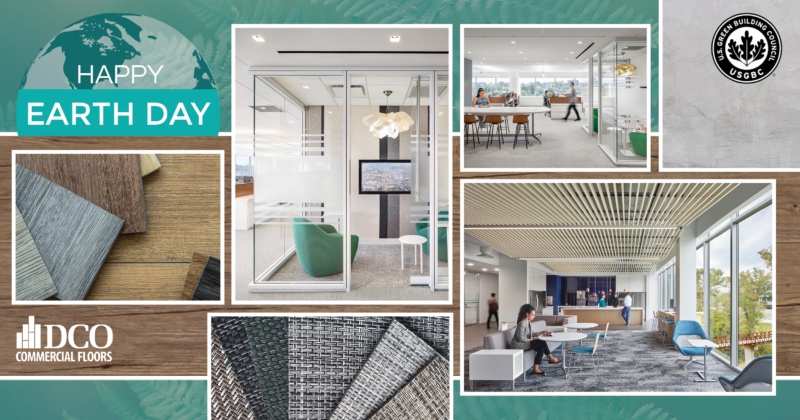
Author: DCOCF Marketing April 22nd, 2022
Reducing the Carbon Footprint: One Tile at a Time
Introduction:
Throughout the years, the commercial flooring industry has looked for ways to bring eco-friendly products to the table without sacrificing quality, functionality, or beauty. The move for reducing the carbon footprint has brought us engineered hardwood, recycled carpet, linoleum, and more. While the move has been eye-opening, it has also shown that industries can scale, while still implementing environmental conservation methods. This earth day, let’s focus on Reducing the Carbon Footprint: One tile at a time.
More and more manufacturers, homeowners, and contractors are recognizing the positive impact on the environment that sustainable flooring options bring. There are many sustainable flooring options that contribute to the longevity, function, and design of any space. recycled carpet, linoleum, and engineered hardwood are just a few on the list. Some ways to reduce the overall carbon footprint on the planet come from shopping green in commercial flooring projects. For example, sustainable product certifications are some of the ways that products can verify the positive impacts they have on the environment. LEED, Floorscore, Declare, EPD (Environmental Product Declarations), and HPD (Health Product Declarations), are all certifications that products can receive for being responsible and sustainable overall.
Luxury Vinyl Tile:
Traditionally, Luxury vinyl tile was considered to be durable, but not as eco-friendly as other options, due to VOC emissions. However, now with the third party certifications and testing there is assurance to the consumer that it is safe and will not pose any health concerns. Bentley Mills has changed the landscape for this product.
Bentley Mills’ luxury Vinyl tile is considered to be FloorScore certified. FloorScore® is the most recognized indoor air quality (IAQ) certification standard for hard surface flooring materials, adhesives, and underlayments. Developed by SCS with the Resilient Floor Covering Institute (RFCI), a leading industry trade association of flooring manufacturers and suppliers, it qualifies for many green building schemes including LEED v4, WELL, BREEAM, CHPS, and Green Globes.
Bentley Mills Luxury Vinyl Tile: 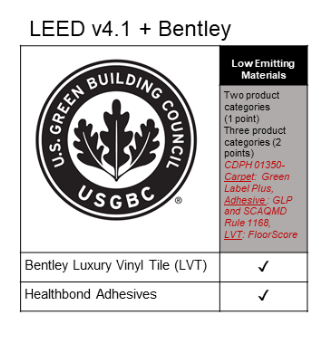
Manufactured in the world’s first LEED EB OM Gold carpet manufacturing facility building, all of their carpet is 100% PVC Free, with sustainability certifications, such as Cradle to Cradle, NSF 140, Green Label Plus and we meet the Red List requirements for the Living Building Challenge. Manufacturing in California challenges us in ways that suppliers based in other states can’t imagine.
Bentley Mills has a variety of sustainable and low emitting options for many different kinds of projects. Bentley’s Luxury vinyl tile specifically meets the requirements to get the CRI Green Label Plus certification. This means that all of Bentley products are certified to meet the requirements of the Carpet and Rug Institute’s (CRI) Green Label Plus test protocol. This independent testing program measures total volatile organic compounds (VOC) emissions as well as individual chemical concentrations. CRI’s Green Label Plus test criteria help customers identify low emitting products.
Today, indoor air quality (IAQ) is an important environmental consideration, especially since we spend approximately 90 percent of our time indoors. The enhanced Green Label Plus program sets a high standard for IAQ and ensures that customers are purchasing the very lowest emitting products on the market. Using scientifically established standards, the Green Label Plus program symbolizes the carpet industry’s commitment to a better environment for living, working, learning, and healing.
To learn more about Bentley’s sustainable flooring options, click here:
Linoleum:
While it used to be thought that Linoleum wasn’t sustainable for the environment because of its association with the high VOC’s in vinyl, Linoleum is making a comeback in the world of environmentally friendly flooring options. Unlike Vinyl, Linoleum is made up of natural and biodegradable ingredients including:
– Linseed oil
– Pine rosin
– Wood
– Cork flour
– Jute

As a result, Linoleum is making a comeback in the space of the commercial flooring industry. Because Linoleum has grown in popularity in the recent years, many manufacturers are creating more designs and colors to fit the more modern style.
Tarkett Linoleum:
Tarkett Linoleum is sustainable right from the start, first with our innovative manufacturing process. Through installed systems such as heat exchangers or photovoltaic systems, we are able to reuse thermal energy. In addition, all of our production standards are designed to either recycle resources or to reuse all waste generated through upcycling.
Tarkett’s linoleum flooring is Cradle to Cradle® certified and has been awarded the “Blue Angel” eco-label and the “Austrian Eco-label”.
As a fully recyclable product, linoleum installation off-cuts can be recycled and the ingredients pose no health risks to humans or animals. Already at the time of manufacture, Tarkett pays attention to the use of regional products to minimize CO2 emissions generated by means of transport.
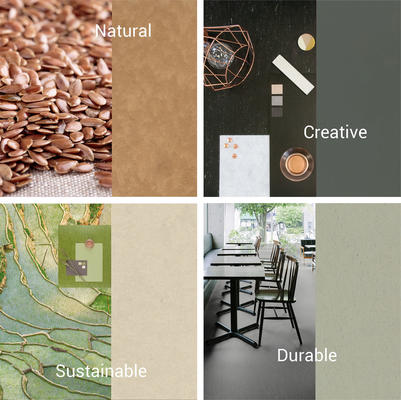
In addition, the floor covering proves to be extremely resistant due to its elasticity and abrasion resistance, and has hardly any traces of wear. Not for nothing, for example, schools, hospitals, public institutions and companies use linoleum flooring adapted to their needs.
Recycled Carpet:
Similarly, recycled flooring is also a great eco-friendly flooring option. It can be in the form of recycled carpet, glass, or even reclaimed hardwood. Mohawk has created innovative recycled carpet contributes to lessening the carbon-footprint, while still bringing quality and functionality to the table.
Mohawk Everstrand:
Mohawk’s Everstrand line consists of Fiber made with up to 100% post-consumer recycled content. It is even stain, soil, and spill-proof. Each square yard of carpet contains on average 63 reclaimed plastic bottles.
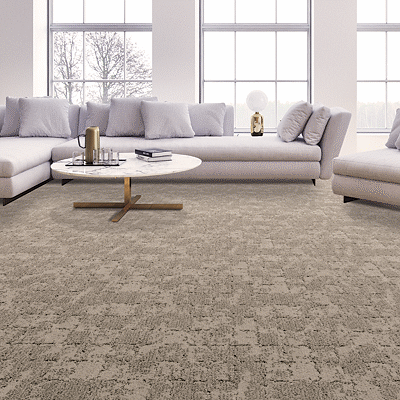
Made from the highest quality PET fiber, engineered to resist dirt and stains for carpet that starts clean and stays clean. EasyCleanTM stain and soil protection protects carpet from spills and makes it simple to clean.
Mohawk’s recycling efforts have made incredible progress in keeping carpet waste out of landfills. Since its inception in 2006, the ReCover program has diverted more than 159 million pounds of carpet away from landfills. Ultimately, because they are willing to reclaim carpet from anyone, anywhere nationwide, Mannington is even keeping our competitors’ carpets out of landfills.
Engineered Hardwood:
Engineered hardwood is an impressive option when it comes to sustainable flooring. It’s a natural material that consists of real wood, but by combining veneer and plywood core, the hardwood is beautiful and functional, while preserving the slower growing hardwood trees. Furthermore, engineered hardwood has the same qualities and regular hardwood, its long-lasting and has a high market value overall.
Mannington Engineered Harwood:
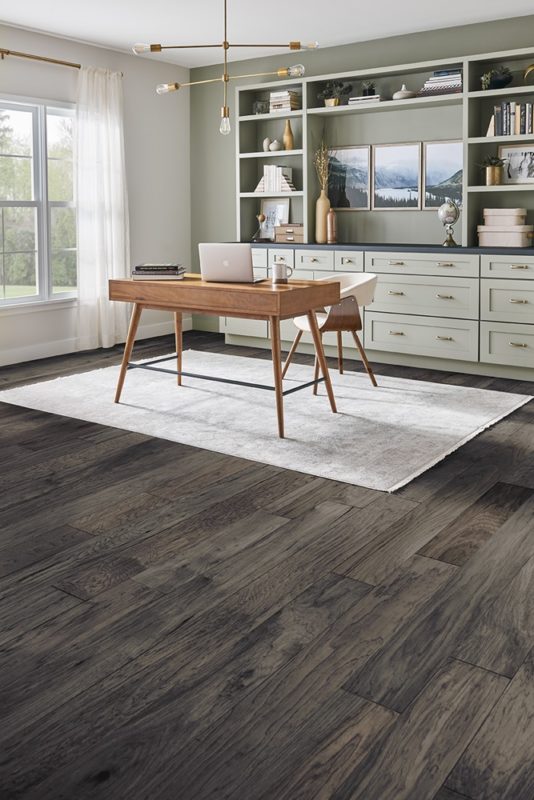
Engineered hardwood flooring is real wood from top to bottom. It’s normally made by using multiple wood veneers or slats of wood glued together at opposing directions. Mannington only produces engineered hardwood and here’s why:
Benefits:
-
- Engineered hardwood is the most environmentally friendly. Engineered hardwood uses half as many trees as solid wood floors
- Engineered hardwood floors can be installed where solid hardwood floors cannot. You can install engineered hardwood below grade and direct to concrete which you can’t do with solid hardwood floors. It’s so versatile, you can even install it on walls!
- Engineered is more dimensionally stable and less likely to warp with seasonal change
- Engineered hardwoods are made of several layers, or ‘plies’ that are glued together in a cross-grain construction. This type of construction is far stronger than a single piece of solid wood; and it’s also more structurally sound–it won’t buckle, gap, cup or twist
Environmental Benefits:
- These floors use half as many trees as solid wood floors
- Faster growing, renewable wood used for inner plies
- Mannington’s wood facility reuses its mill waste for energy
- Mannington uses only water-based finishes that contain no VOCs
- Mannington uses a formaldehyde free adhesive system that meets or beats the most stringent indoor air quality standards.
Conclusion:
Overall, it’s important to be looking at these sustainable options in commercial flooring and work to implement these options into our projects as a whole. This Earth day, we want to celebrate the ability we have to work together and continue reducing the carbon footprint: one tile at a time.
To learn more about DCO Commercial Floors, click here:
Read our latest blog post.
About the firm: DCO Commercial Floors is a nationwide flooring dealer that is committed to being a flooring solutions leader for all finishes, bridging the gap between traditional floor covering and modern access flooring solutions. We provide comprehensive project management so that your project is smooth from the estimating stages to breaking down the bid, and procurement, from install to closeout. DCO will provide and deliver on all facets to become the partner of choice for your project.
